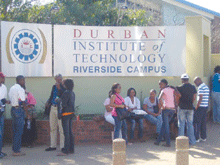Mergers between black and white universities in South Africa to transform higher education after apartheid have been “difficult and messy” and have distracted attention from expanding student numbers, say the country’s vice-chancellors.
 South Africa will need at least six more universities to raise participation in higher education from the current 15 percent, and the sector is now asking whether the mergers ordered by the government (known in some quarters as the “murders”) had been necessary, says Roy du Pré, vice-chancellor of Durban University of Technology and spokesman for Higher Education South Africa, which represents the heads of the country’s universities.
South Africa will need at least six more universities to raise participation in higher education from the current 15 percent, and the sector is now asking whether the mergers ordered by the government (known in some quarters as the “murders”) had been necessary, says Roy du Pré, vice-chancellor of Durban University of Technology and spokesman for Higher Education South Africa, which represents the heads of the country’s universities.
“The mergers have been very difficult and taken our eye off the international ball. While the rest of the world has been excited about growth, we have spent a lot of time dealing with mergers,” he told the conference of Association of Commonwealth Universities in Durban on July 14.
The mergers have reduced the number of universities from 32 to 23. Ironically, Prof. du Pré’s own institution was the result of the only voluntary merger, between adjacent technical universities for black and Indian students in 2002, which has worked. The other mergers were pushed through by the government in 2004 and many have still not gelled and might even be reversed, he says. At the same time real terms funding per student in South African universities has fallen as the numbers have risen from 500,000 in 1999 to 740,000 in 2006.
Prof. du Pré believes universities should work with the government to achieve its objectives without sacrificing autonomy and academic freedom. He and other VCs meet regularly with President Thabo Mbeki and his ministers to discuss policy, and he feels this is working.
But the case of Makerere University in Uganda which was taken over by the state is a warning of the damage that could be done. “The sector will constantly have to make the case to prove the value of autonomy... but institutional autonomy will depend on being responsive to the needs of the state,” he says.
Prof. du Pré predicts that the end result of the government policy of “tweaking” spending will prompt the six big institutions to compete with the world, plus the rest.
(Excerpted and adapted from The Times Higher Education Supplement)